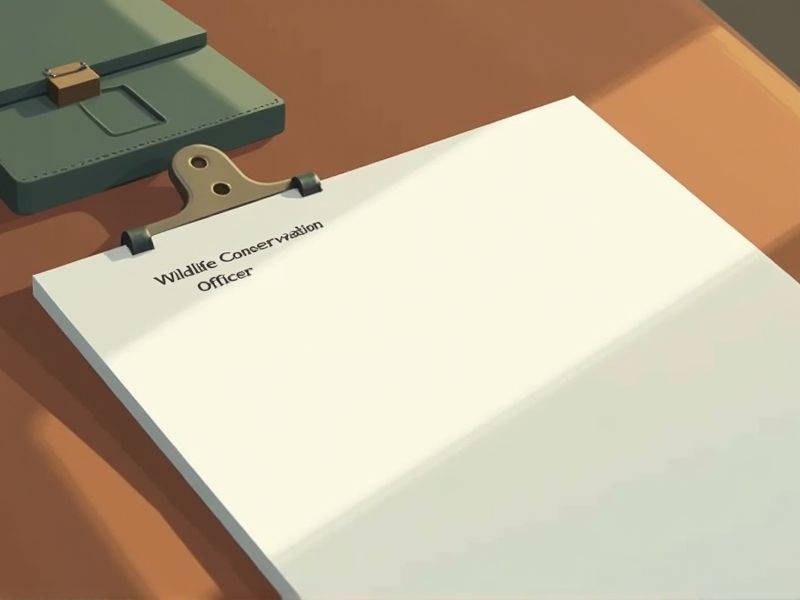
Wildlife Conservation Officers are tasked with the protection and management of natural resources, which necessitates a deep understanding of ecosystems and legal regulations. Certifications ensure they have the necessary skills and knowledge to handle wildlife safely and enforce laws effectively. These qualifications also enhance their ability to engage with communities and promote conservation initiatives. Some essential certifications for a Wildlife Conservation Officer are listed here.
Certified Wildlife Biologist (CWB)
A Certified Wildlife Biologist (CWB) possesses the specialized knowledge crucial for managing and conserving wildlife populations effectively. Their expertise ensures that wildlife conservation programs are grounded in scientific principles, which can lead to more sustainable and successful outcomes. They have the skills necessary to assess and mitigate the impact of human activities on ecosystems, supporting balanced conservation efforts. CWBs also bring a standardized level of professionalism and ethical responsibility, promoting trust and collaboration among stakeholders in wildlife conservation initiatives.
Wildlife Law Enforcement Certification
Wildlife Law Enforcement Certification equips Wildlife Conservation Officers with the necessary knowledge to effectively enforce environmental laws and protect endangered species. Certification ensures officers comprehend legislative frameworks, which enhances their ability to investigate and prosecute wildlife crimes accurately. Gaining certification provides officers with skills in handling human-wildlife conflicts responsibly, preventing potential harm to communities and ecosystems. This certification also signifies a commitment to ethical standards and best practices in conservation efforts.
Certified Conservation Professional (CCP)
A Certified Conservation Professional ensures standardized knowledge and effective skill sets, enhancing wildlife conservation strategies. Lack of uniform training in conservation roles can lead to inconsistent practices and reduced success in protecting biodiversity. CCP designation fosters credibility and public trust in wildlife conservation efforts, leading to better community involvement. Continuous professional development provided through CCP keeps officers updated on the latest conservation technologies and methodologies.
Emergency Medical Technician (EMT) Certification
Wildlife conservation officers frequently encounter situations where immediate medical response is necessary, and EMT certification equips them with essential first aid skills. Many wildlife operations occur in remote areas where medical facilities are not readily accessible, so having EMT training ensures necessary intervention until professional help arrives. The certification provides the officers with knowledge to handle potential injuries encountered by both wildlife and humans in the field. Programmatic requirements often mandate EMT training as it enhances the officer's capability to perform in emergencies, thereby improving overall mission effectiveness.
Incident Command System (ICS) Certification
Wildlife Conservation Officers often face emergencies like wildfires, floods, or wildlife incidents that require structured management, and ICS Certification provides the skills for effective coordination and communication. The standardized ICS structure enables officers to operate seamlessly with other agencies, crucial for managing disasters involving multiple jurisdictions. ICS training sharpens decision-making abilities under pressure, vital for protecting natural habitats and wildlife resources. This certification helps ensure safety protocols are followed, reducing risks to both the officers and the wildlife they aim to protect.
Geographic Information Systems (GIS) Certification
A GIS Certification equips Wildlife Conservation Officers with the technical skills necessary to analyze spatial data effectively, enabling more accurate habitat and species management. It enhances decision-making by providing visual representations of geographic data, crucial for tracking animal movements and assessing environmental changes. Officers with GIS expertise can efficiently identify and mitigate potential threats to wildlife, such as habitat fragmentation and illegal poaching hotspots. Certification also fosters collaboration by standardizing data sharing and communication with other conservation entities and stakeholders.
Endangered Species Management Certification
The Endangered Species Management Certification equips Wildlife Conservation Officers with the necessary skills to effectively monitor and protect at-risk species. This certification provides officers with the knowledge to implement conservation strategies that comply with legal frameworks and support biodiversity. Without this specialized training, efforts may be inefficient, potentially accelerating the decline of endangered populations. Educated officers enhance collaborative initiatives with conservation organizations and neighboring habitats, fostering a more comprehensive approach to wildlife management.
Firearms Training Certification
Wildlife Conservation Officers often encounter situations where they must enforce laws and regulations, necessitating the ability to operate firearms safely to ensure both public and personal safety. Proper firearms training certification reduces the risk of accidents during operations in densely forested areas where visibility can be limited. Comprehensive training ensures officers are prepared to handle potential encounters with aggressive wildlife where non-lethal methods may not suffice. Certification provides a standardized level of competency, essential for consistency and trust in enforcement practices across different regions.
Environmental Impact Assessment Certification
Environmental Impact Assessment (EIA) Certification equips Wildlife Conservation Officers with the ability to understand potential environmental effects of proposed projects on wildlife habitats. With this knowledge, they can advocate for strategies that mitigate negative impacts on ecosystems. This certification also enables officers to assess compliance with environmental regulations, ensuring that conservation efforts align with legal requirements. By possessing this certification, officers enhance their credibility and effectiveness in collaborating with other stakeholders in conservation initiatives.
Wildlife Forensic Investigation Certification
Wildlife Forensic Investigation Certification equips Wildlife Conservation Officers with the necessary skills to accurately assess wildlife crimes, leading to more effective law enforcement. This certification enhances their ability to gather and analyze evidence, which is crucial in prosecuting poachers and illegal traffickers. Training in forensic methods ensures that officers can identify species accurately and support biodiversity preservation efforts. By understanding forensic processes, officers contribute to more informed policy-making and resource allocation for conservation initiatives.
Summary
By obtaining certifications, you enhance your capabilities as a Wildlife Conservation Officer. Your professional credibility increases, which may lead to more effective collaboration with conservation organizations. The certification equips you with specialized knowledge, enabling better decision-making in wildlife management. As a result, you contribute significantly to the preservation and restoration of ecosystems.
